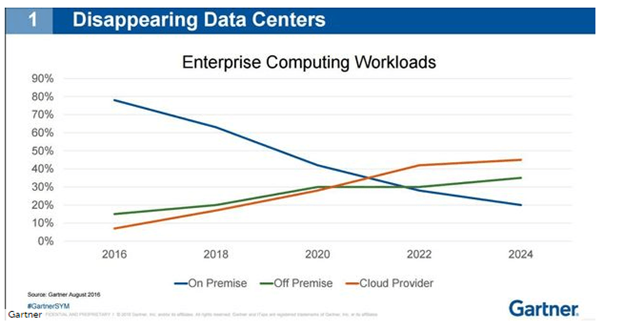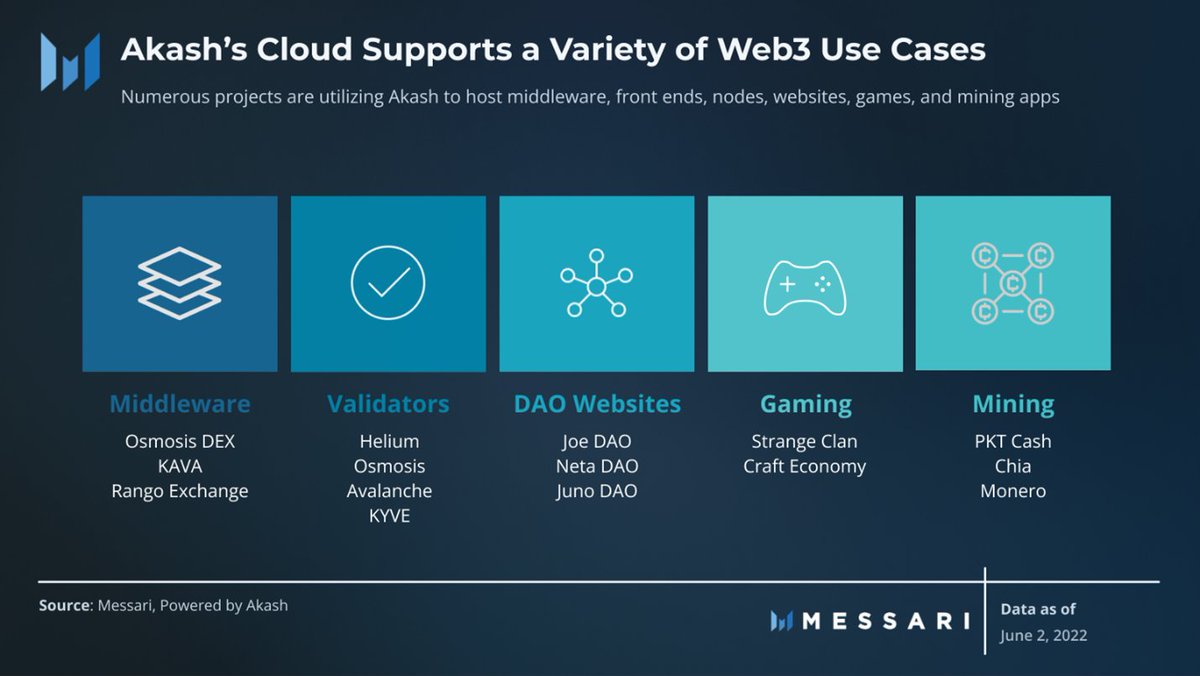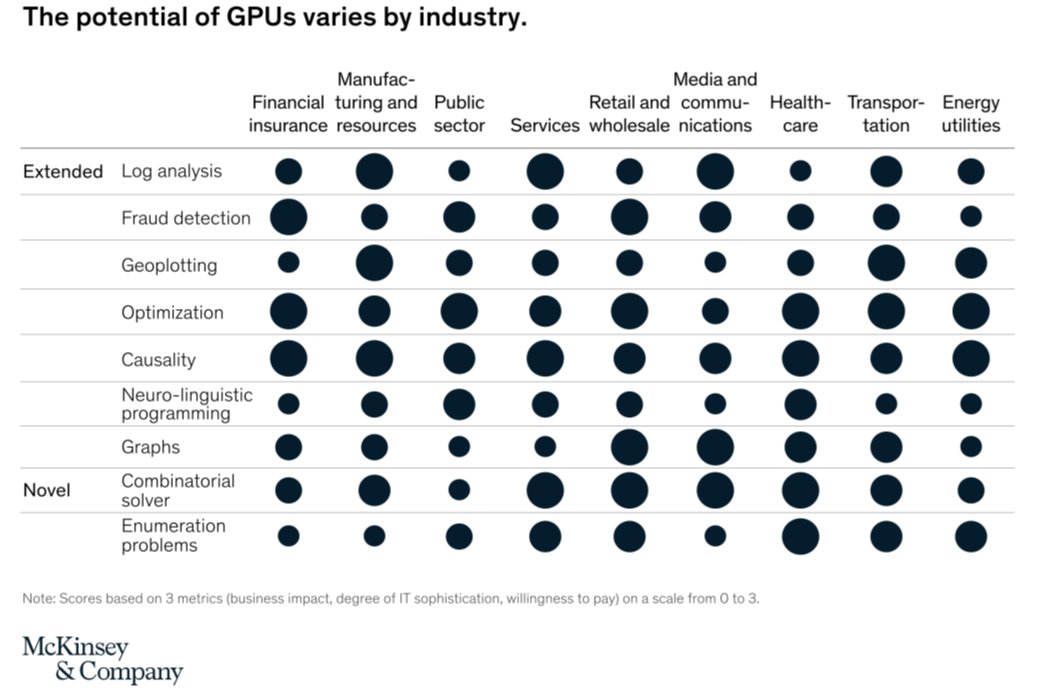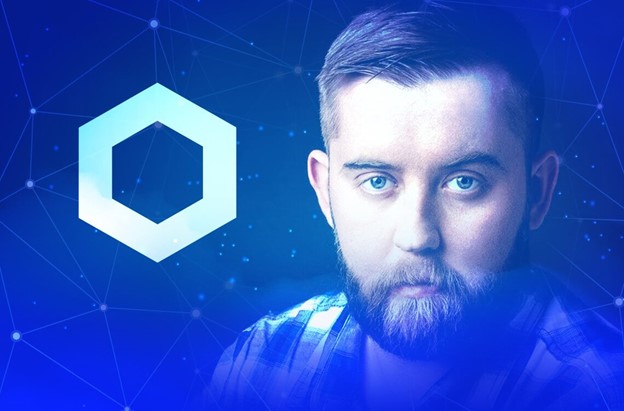@akashnet_ may be one of the biggest hidden gems in #Web3 💎
Unfortunately, fewer than 1% of people understand why
Here’s the unexpected reason $AKT could 100x
(hint: it all has to do with AI…)
👇
🧵
Unfortunately, fewer than 1% of people understand why
Here’s the unexpected reason $AKT could 100x
(hint: it all has to do with AI…)
👇
🧵

2/
Akash is a decentralized marketplace for cloud computing (we’ll explain this in a second)
It has a MC of $24M, FDV of $80M, and its $AKT token trades at $0.21
In 2021, the price hit $8.08
Akash is a decentralized marketplace for cloud computing (we’ll explain this in a second)
It has a MC of $24M, FDV of $80M, and its $AKT token trades at $0.21
In 2021, the price hit $8.08
3/
This thread will cover the following:
• What is the Cloud?
• What problem does #Akash solve?
• How does it work?
• Why is its potential goes beyond the Cloud
• What are its #tokenomics?
• What’s the potential value of $AKT?
This thread will cover the following:
• What is the Cloud?
• What problem does #Akash solve?
• How does it work?
• Why is its potential goes beyond the Cloud
• What are its #tokenomics?
• What’s the potential value of $AKT?
4/
🔶 What is the Cloud?
“Cloud computing” is just a fancy term for “using someone else’s computer”
Instead of using your own computer to store data or perform calculations, you can use the internet to connect to a remote computer owned by Amazon, Microsoft, Google, etc…
🔶 What is the Cloud?
“Cloud computing” is just a fancy term for “using someone else’s computer”
Instead of using your own computer to store data or perform calculations, you can use the internet to connect to a remote computer owned by Amazon, Microsoft, Google, etc…

5/
These remote computers are often held in massive “data centers”
Data centers are huge buildings (or complexes of buildings) that can each host millions of individual computers (called “servers”)
There are currently 8M+ data centers across the globe
These remote computers are often held in massive “data centers”
Data centers are huge buildings (or complexes of buildings) that can each host millions of individual computers (called “servers”)
There are currently 8M+ data centers across the globe

6/
Cloud computing is one of the greatest advancements of the 21st century
It allows companies to access crucial computing resources without having to spend a bunch of money on hardware, maintenance or security
As such, most businesses have transitioned to “the Cloud”
Cloud computing is one of the greatest advancements of the 21st century
It allows companies to access crucial computing resources without having to spend a bunch of money on hardware, maintenance or security
As such, most businesses have transitioned to “the Cloud”

7/
🔶 Problem
Unfortunately, the “Cloud” isn’t all it’s cracked up to be
Three players - Amazon AWS, Google Cloud Partners and Microsoft Azure - control over 60% of the market
This creates several problems:
• High costs
• Risks of censorship
• Underutilized resources
🔶 Problem
Unfortunately, the “Cloud” isn’t all it’s cracked up to be
Three players - Amazon AWS, Google Cloud Partners and Microsoft Azure - control over 60% of the market
This creates several problems:
• High costs
• Risks of censorship
• Underutilized resources

8/
🔹 High Costs
Amazon, Google and Microsoft use their dominant position to extract heavy taxes on their users
@a16z estimates that the top 50 publicly traded software companies spend in excess of $8B for cloud services (~50% of revenue)
🔹 High Costs
Amazon, Google and Microsoft use their dominant position to extract heavy taxes on their users
@a16z estimates that the top 50 publicly traded software companies spend in excess of $8B for cloud services (~50% of revenue)

9/
🔹 Risk of Censorship
Control also leads to censorship risks
The major cloud providers can ban anyone they want, at any time and for any reason
🔹 Risk of Censorship
Control also leads to censorship risks
The major cloud providers can ban anyone they want, at any time and for any reason

10/
This may be an even bigger threat to #Web3, as over 2/3rds of Ethereum and Solana nodes are hosted by major cloud providers
This may be an even bigger threat to #Web3, as over 2/3rds of Ethereum and Solana nodes are hosted by major cloud providers

11/
🔹 Underutilized Resources
Finally, the Cloud is woefully inefficient
While there are over 8 million data centers in the world, most operate well below capacity
(it is estimated that 30% to 85% of servers are underutilized)
🔹 Underutilized Resources
Finally, the Cloud is woefully inefficient
While there are over 8 million data centers in the world, most operate well below capacity
(it is estimated that 30% to 85% of servers are underutilized)

12/
🔶 Solution
#AKT is solving this problem with a decentralized marketplace for cloud computing
Anyone can be a customer
And anyone with sufficient hardware – including individuals or the 8.4M underutilized data centers – can join and sell their computing power for cash
🔶 Solution
#AKT is solving this problem with a decentralized marketplace for cloud computing
Anyone can be a customer
And anyone with sufficient hardware – including individuals or the 8.4M underutilized data centers – can join and sell their computing power for cash

13/
Often called the “AirBnB” for cloud computing, $AKT is poised to break the stranglehold that “Big Tech” has on computing resources
The network is cheaper, more reliable, more efficient and – most importantly – highly resistant to censorship
Often called the “AirBnB” for cloud computing, $AKT is poised to break the stranglehold that “Big Tech” has on computing resources
The network is cheaper, more reliable, more efficient and – most importantly – highly resistant to censorship
https://twitter.com/gregosuri/status/1569396448411930624
14/
Akash can be used for a variety of services such as:
• Middleware
• Validators
• #DAO websites
• Gaming
• Mining
Akash can be used for a variety of services such as:
• Middleware
• Validators
• #DAO websites
• Gaming
• Mining

15/
🔶 How does Akash Work?
#Akash operates a two-sided marketplace with two key stakeholders:
• Tenants: Customers seeking computing resources
• Providers: Data centers (or any person with compute & storage capacity) that can provide computing resources
🔶 How does Akash Work?
#Akash operates a two-sided marketplace with two key stakeholders:
• Tenants: Customers seeking computing resources
• Providers: Data centers (or any person with compute & storage capacity) that can provide computing resources

16/
To utilize the network, customers specify their needs and submit a “request for bids” to the network
Providers receive these requests and respond with a bid
The provider with the lowest bid wins the contract
To utilize the network, customers specify their needs and submit a “request for bids” to the network
Providers receive these requests and respond with a bid
The provider with the lowest bid wins the contract
17/
🔶 Market
The global market for cloud compute is expected to rise from $380 billion in 2021 to $1.6 trillion in 2030
🔶 Market
The global market for cloud compute is expected to rise from $380 billion in 2021 to $1.6 trillion in 2030

18/
🔶 Competition
Centralized storage and compute is currently dominated by the “Big 4” cloud providers – Amazon AWS, Google Cloud, Microsoft Azure and Alibaba
🔶 Competition
Centralized storage and compute is currently dominated by the “Big 4” cloud providers – Amazon AWS, Google Cloud, Microsoft Azure and Alibaba

19/
$AKT offers several benefits compared to traditional cloud providers. It is:
• Cheaper
• Censorship resistant
• More reliable
• Private
• Flexible
$AKT offers several benefits compared to traditional cloud providers. It is:
• Cheaper
• Censorship resistant
• More reliable
• Private
• Flexible

20/
🔹 Cheaper
#AKT is significantly cheaper than AWS, Google Cloud Platform (GCP), or Microsoft's Azure, with a cost savings of up to 80-90%.
🔹 Cheaper
#AKT is significantly cheaper than AWS, Google Cloud Platform (GCP), or Microsoft's Azure, with a cost savings of up to 80-90%.

21/
🔹 Censorship Resistant
Unlike AWS, who can “deplatform” apps that violate their terms of service, Akash can’t censor or ban any user for any reason
🔹 Censorship Resistant
Unlike AWS, who can “deplatform” apps that violate their terms of service, Akash can’t censor or ban any user for any reason
https://twitter.com/gregosuri/status/1403481458681909248
22/
🔹 More reliable
Decentralized networks are more resilient to crashes and outages
If one data center goes down, Akash can simply switch to another
🔹 More reliable
Decentralized networks are more resilient to crashes and outages
If one data center goes down, Akash can simply switch to another

23/
🔹 Privacy
Tenants can choose to remain anonymous. This is important because if a deployment is hacked, critical information will be protected
Customers also aren’t forced to use a credit card, which is ideal for DAOs
🔹 Privacy
Tenants can choose to remain anonymous. This is important because if a deployment is hacked, critical information will be protected
Customers also aren’t forced to use a credit card, which is ideal for DAOs
https://twitter.com/gregosuri/status/1418243540249833478
24/
🔹 Flexible
#Akash customers can select data centers based on their needs
For instance, a gaming dapp may want to use a cheaper, but less secure provider, while a DeFi protocol may opt for higher security
🔹 Flexible
#Akash customers can select data centers based on their needs
For instance, a gaming dapp may want to use a cheaper, but less secure provider, while a DeFi protocol may opt for higher security

25/
🔶 Traction
$AKT currently has over 40 active providers representing 409 leases
This number has grown 288% in the last 18 months (or 20% per quarter)
🔶 Traction
$AKT currently has over 40 active providers representing 409 leases
This number has grown 288% in the last 18 months (or 20% per quarter)

26/
Notable projects powered by #AKT include Anonstake, Blockless, Praetor, HNS Search, Chia Network, Cosmos Directory, Third Web and Juno Network
Notable projects powered by #AKT include Anonstake, Blockless, Praetor, HNS Search, Chia Network, Cosmos Directory, Third Web and Juno Network

27/
🔶 Team
Akash is a part of Overclock Labs, which is headquarted in San Francisco and lists 91 employees on LinkedIn
Notable team members include CEO @gregosuri, CTO @abozanich, COO @boz_menzalji and CFO @LeChenghiskhan
🔶 Team
Akash is a part of Overclock Labs, which is headquarted in San Francisco and lists 91 employees on LinkedIn
Notable team members include CEO @gregosuri, CTO @abozanich, COO @boz_menzalji and CFO @LeChenghiskhan
28/
🔶 Tokenomics
$AKT is the native token of Akash
It has a circulating supply of 113.9M and total supply of 388.5M
Below we will cover $AKT ’s:
• Usage
• Initial distribution
• Emissions schedule
🔶 Tokenomics
$AKT is the native token of Akash
It has a circulating supply of 113.9M and total supply of 388.5M
Below we will cover $AKT ’s:
• Usage
• Initial distribution
• Emissions schedule
29/
🔹 Token Usage
$AKT is a utility and governance token with several uses
• Fees: Transaction fees and block rewards are denominated in $AKT
• Governance: The token is used for governance
Tenants can also choose to settle leases with $AKT
🔹 Token Usage
$AKT is a utility and governance token with several uses
• Fees: Transaction fees and block rewards are denominated in $AKT
• Governance: The token is used for governance
Tenants can also choose to settle leases with $AKT
30/
🔹 Initial Distribution
Akash distributed 100M tokens in its 2020 launch to the public, investors, team, foundation, ecosystem, testnet and select vendors
These tokens have a 3-year unlock schedule which is shown below:
🔹 Initial Distribution
Akash distributed 100M tokens in its 2020 launch to the public, investors, team, foundation, ecosystem, testnet and select vendors
These tokens have a 3-year unlock schedule which is shown below:

31/
🔹 Emissions Schedule
$AKT is an inflationary token with a capped supply of 388.5M tokens
Inflation started at 4.5% per month and gradually decreases over time
An expected emissions schedule for the decade is below
🔹 Emissions Schedule
$AKT is an inflationary token with a capped supply of 388.5M tokens
Inflation started at 4.5% per month and gradually decreases over time
An expected emissions schedule for the decade is below

32/
🔶 Potential Valuation
If #Akash achieves its ultimate goal of capturing 1% of the $1.6 trillion cloud computing industry, that would imply an FDV of $16 billion
That’s a 200x increase over the networks FDV value today!
🔶 Potential Valuation
If #Akash achieves its ultimate goal of capturing 1% of the $1.6 trillion cloud computing industry, that would imply an FDV of $16 billion
That’s a 200x increase over the networks FDV value today!
33/
🔶 Untapped Potential
$AKT offers numerous benefits to users
When compared to the Cloud, it’s cheaper, more reliable, more flexible, censorship resistant and private
While these are boon to #dapps, there may be an even bigger potential for $AKT that few are discussing…
🔶 Untapped Potential
$AKT offers numerous benefits to users
When compared to the Cloud, it’s cheaper, more reliable, more flexible, censorship resistant and private
While these are boon to #dapps, there may be an even bigger potential for $AKT that few are discussing…
34/
Akash is currently building out its GPU network, which could have massive ramifications for the protocol
Not only are GPUs the primary tool for AI (ML and DL), but they are also used in rendering, gaming, IOT, zero knowledge proofs and a variety of industrial applications
Akash is currently building out its GPU network, which could have massive ramifications for the protocol
Not only are GPUs the primary tool for AI (ML and DL), but they are also used in rendering, gaming, IOT, zero knowledge proofs and a variety of industrial applications

35/
This represents a massive opportunity for $AKT as many of these use cases have potential values in the tens of trillions! (e.g. AI alone is expected to be worth $80T)
A successful entrance into any one of these spaces could increase $AKTs value by orders of magnitude
This represents a massive opportunity for $AKT as many of these use cases have potential values in the tens of trillions! (e.g. AI alone is expected to be worth $80T)
A successful entrance into any one of these spaces could increase $AKTs value by orders of magnitude

36/
If you want to learn more about AKT, I suggest following:
@ovrclk_
@nirajhodler
@akashians_
@cloudmosio
@johnniecosmos
@praetor_app
Please tag anyone I missed!
If you want to learn more about AKT, I suggest following:
@ovrclk_
@nirajhodler
@akashians_
@cloudmosio
@johnniecosmos
@praetor_app
Please tag anyone I missed!
37/
Note: This is obviously not financial or investment advice nor a recommendation to purchase AKT
It’s just a few thoughts on how things could potentially play out
Like with any forecast, it’s a guess at best, and just as many things could go wrong and drive the price to $0
Note: This is obviously not financial or investment advice nor a recommendation to purchase AKT
It’s just a few thoughts on how things could potentially play out
Like with any forecast, it’s a guess at best, and just as many things could go wrong and drive the price to $0
I hope you've found this thread helpful.
Follow me @MTorygreen for more fundamental analysis on Web3 protocols.
Like/Retweet the first tweet below if you can:
Follow me @MTorygreen for more fundamental analysis on Web3 protocols.
Like/Retweet the first tweet below if you can:
https://twitter.com/MTorygreen/status/1612494500060106753
• • •
Missing some Tweet in this thread? You can try to
force a refresh
















